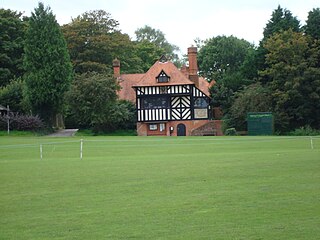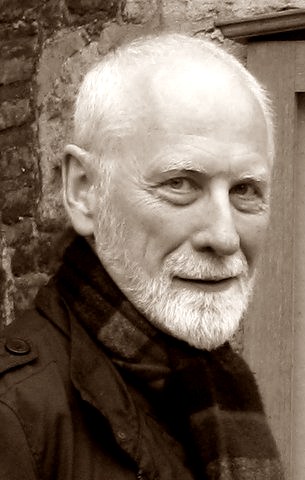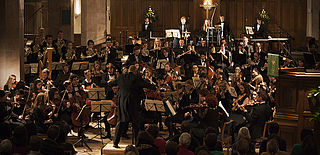Related Research Articles

Johann Christian Bach was a German composer of the Classical era, the youngest son of Johann Sebastian Bach. He received his early musical training from his father, and later from his half-brother, Carl Philipp Emanuel Bach in Berlin. After his time in Berlin he made his way to Italy to study with famous Padre Martini in Bologna. While in Italy, J.C. Bach was appointed as an organist at the Milan Cathedral. In 1762 he became a composer to the King’s Theatre in London where he wrote a number of successful Italian operas and became known as "The English Bach". He is responsible for the development of the sinfonia concertante form. He became one of the most influential figures of the classical period, influencing compositional styles of prolific musicians like Haydn and Mozart.

Edward George Power Biggs was a British-born American concert organist and recording artist.

Tilford is a village and civil parish centred at the point where the two branches of the River Wey merge in Surrey, England, 3 miles (4.8 km) south-east of Farnham. It has half of Charleshill, Elstead in its east, a steep northern outcrop of the Greensand Ridge at Crooksbury Hill on Crooksbury Common in the north and Farnham Common (woodland) Nature Reserve in the west, which has the Rural Life Living Museum. As the Greensand Ridge in its western section is in two parts, the Greensand Way has a connecting spur here to its main route running east–west to the south.

George John Malcolm CBE KSG was an English pianist, organist, composer, harpsichordist, and conductor.
Joan Lippincott is an American concert organist and former head of the organ department at Westminster Choir College in Princeton, New Jersey.
Paul Steinitz OBE was an English post-war organist, best known as an interpreter of Johann Sebastian Bach's music. He founded the London Bach Society and Steinitz Bach Players, performing among other significant Bach projects, a complete cycle of Bach's cantatas, mainly in London venues, over a period of 29 years, the first public cycle of the extant church and secular works in the UK.
The London Bach Society is a society devoted to performing the music of Johann Sebastian Bach (1685–1750) with small, professional forces, using period instruments in order to obtain an authentic style of interpretation.
Robin Blaze is a British countertenor.

Christopher Herrick is an English concert organist best known for his interpretation of J.S. Bach’s organ music and for his many recordings on the finest pipe organs from around the world.
Saint Peter's Singers (SPS) is a chamber choir associated with Leeds Minster, Leeds, West Yorkshire, England that celebrated during the Season 2017/2018 the fortieth anniversary of the choir's formation by Harry Fearnley in 1977. An anniversary concert took place at Leeds Minster on Sunday 25 June 2017 with the National Festival Orchestra and soloists Kristina James, Joanna Gamble, Paul Dutton and Quentin Brown. Further anniversary year events included Bach Cantatas and Music for Christmas at Fulneck Church in August and December respectively, Handel Coronation Anthems at Holy Trinity, Boar Lane as part of the Leeds Handel Festival in September and a tour of East Anglia in October. In November at Leeds Town Hall, the Singers participated in Herbert Howells's masterpiece Hymnus Paradisi with Leeds Philharmonic Chorus and Leeds College of Music Chorale under the direction of Dr David Hill with the Orchestra of Opera North. 2018 began with a concert of Sacred Choral Masterworks at Leeds Town Hall in February and Bach's Mass in B minor at Leeds Minster on Good Friday 2018 in memory of long-serving member Jan Holdstock. The final concert of the current season takes place at Leeds Minster on Sunday 24 June at Leeds Minster at 5.30. At this event will be presented the first performance of a new work from composer Philip Moore commissioned for the Singers' 40th anniversary – the motet Tu es Petrus – along with music by E W Naylor, Arvo Part, Sir Hubert Parry, Judith Bingham and Maurice Durufle.
Bálint Karosi is a Hungarian organist and composer.
Carl Rütti is a notable Swiss composer, who has written much choral music.
Sheffield Bach Society was founded in 1950 to commemorate the 200th anniversary of the death of J S Bach in Leipzig, and to bring the music of Bach to Sheffield audiences. Its current conductor is Philip Collin, who has been the conductor since September 2023.
Bath Bach Choir, formerly The City of Bath Bach Choir (CBBC), is based in Bath, Somerset, England, and is a registered charity. Founded in 1946 by Cuthbert Bates, who also became a founding father of the Bath Bach Festival in 1950, the choir's original aim was to promote the music of Johann Sebastian Bach via periodic music festivals. Bates – an amateur musician with a great love and understanding of this composer's works – was also the CBBC's principal conductor and continued in this role until his sudden death, in April 1980. This untimely exit pre-empted his planned retirement concert performance of J. S. Bach's Mass in B minor, scheduled for July of the same year, and effectively ended the first period of the choir's history.
Paul Spicer is an English composer, conductor, and organist. He taught choral conducting at the Royal College of Music and conducted the RCM Chamber Choir between 1995 and 2008. Until his retirement in July 2022 he also taught at the Royal Birmingham Conservatoire and conducted their chamber choir which records for Somm Records. He also teaches at Oxford and Durham universities. Since 2004 he has been the conductor of the Petersfield Festival. He was Senior Producer for BBC Radio 3 for the Midlands Region based in Birmingham between 1984 and 1990 after which he moved to be artistic director of the Lichfield Festival. He also produced for various record companies over many years. He founded the Finzi Singers in 1984 making many recordings for Chandos Records. He conducts the Birmingham Bach Choir and the Whitehall Choir in London. His compositions include two oratorios for Easter and for Advent with libretti by the Dr Tom Wright and a choral symphony 'Unfinished Remembering' (2014) to a libretto by Euan Tait commemorating the outbreak of World War 1. He runs a series of choral courses under the banner of The English Choral Experience based mainly at Abbey Dore in Herefordshire.

The Edinburgh University Music Society (EUMS) is a student-run musical organisation based in Edinburgh. Since its founding in 1867, the EUMS has been based within the University of Edinburgh.
Classical music in Birmingham began in the late Middle Ages, mainly devotional music which did not survive the Reformation. Evidence is scant until the years following the Restoration of the Monarchy in 1660, when Birmingham's economy boomed. This was reflected in the scientific and cultural awakening known as the Midlands Enlightenment. The first sign of this transformation was the opening of the baroque St Philip's Church in 1715, which had a fine organ that attracted gifted musicians to the town.
Antoine Geoffroy-Dechaume was a French musicologist, organist and harpsichordist. As a musicologist he was considered "the leading French pioneer in the field of early music, both in the way it should be performed and in respect for the original scores of 16th, 17th and 18th century composers." His research and writings, especially his book The Secrets of Early Music, or the search for its interpretation (1964), is credited as the catalyst for the revived interest in French baroque music by the classical music world during the 1970s. He was named a Chevalier of the Légion d'honneur by the government of France.
St Albans Bach Choir is an amateur choir based in the English cathedral city of St Albans. Since its founding in 1924 it has performed a wide range of choral music including but by no means limited to the great Bach masterpieces. It strives for the highest possible standards of music making, employing soloists of the highest calibre and professional orchestras. Performances are normally held in St Albans Cathedral. Currently, the Musical Director is Andrew Lucas, Master of the Music at the Cathedral.

Throughout the 18th century, the appreciation of Johann Sebastian Bach's music was mostly limited to distinguished connoisseurs. The 19th century started with publication of the first biography of the composer and ended with the completion of the publication of all of Bach's known works by the Bach Gesellschaft. A Bach Revival had started from Mendelssohn's performance of the St Matthew Passion in 1829. Soon after that performance, Bach started to become regarded as one of the greatest composers of all times, if not the greatest, a reputation he has retained ever since. A new extensive Bach biography was published in the second half of the 19th century.
References
- ↑ Randel, Don Michael (2003). The Harvard Dictionary of Music. Harvard University Press. ISBN 9780674011632.
- ↑ Maggie Humphreys; Robert Evans (1997-01-01). Dictionary of Composers for the Church in Great Britain and Ireland. A&C Black. p. 86. ISBN 978-0-7201-2330-2.
- ↑ anon (?) (4 March 2015). "Denys Darlow, organist - obituary: Festival organiser, composer and organist who was a leading figure in the early music revival". Daily Telegraph (online). Retrieved 29 May 2015.
- ↑ Richard Adams (1986). A book of British music festivals. R. Royce. p. 50. ISBN 978-0-947728-22-9.
- ↑ "Tilford Bach Society Concert - Farnham Town Council". www.farnham.gov.uk. Archived from the original on 2017-12-01.
- ↑ Registered Charity 1172416
- ↑ "Welcome to Conservatoire Concerts in Godalming". conservatoireconcerts.org.uk. Retrieved 2024-08-13.
- ↑ "TBS – Chamber Music Concerts in Farnham – High quality baroque and classical concerts".
- ↑ "Orchestra | Farnham Sinfonia (cio) | FarnhamFarnham Sinfonia concert". Farnham Sinfonia.
- ↑ Registered Charity 1197475
- ↑ "Welcome to the Tilford Bach Festival website". tilfordbachfestival.com. Retrieved 2024-08-13.